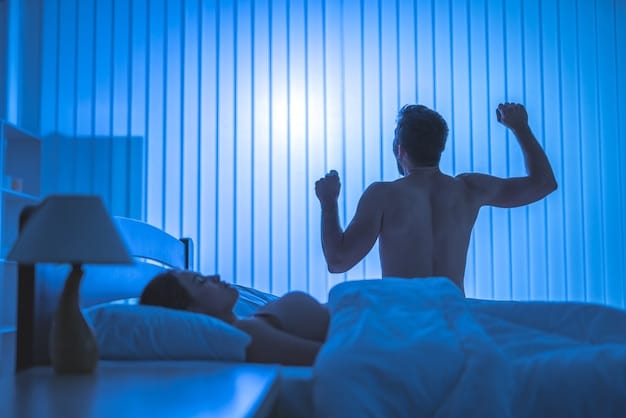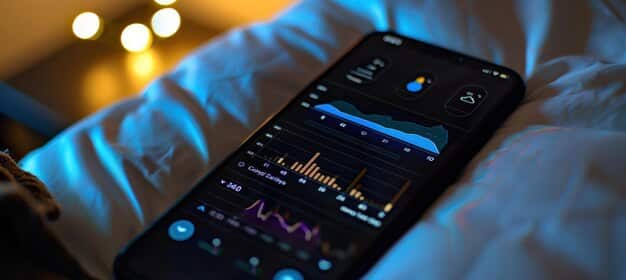Improve Sleep Quality: Data-Driven Mental Health Guide for Men

Improve sleep quality is crucial for men’s mental health, and this data-driven guide explores practical strategies, from optimizing sleep schedules to leveraging technology, to achieve better rest and enhance overall well-being.
Are you struggling with restless nights and feeling the impact on your mental health? This data-driven guide provides actionable steps to improve sleep quality, specifically tailored for men seeking better mental well-being.
Understanding the Sleep-Mental Health Connection
The link between sleep and mental health is profound. Lack of sleep can exacerbate mental health issues like anxiety and depression, while good sleep can significantly improve mood and cognitive function. Understanding this connection is the first step toward prioritizing your sleep.
The Impact of Poor Sleep on Mental Health
Chronic sleep deprivation can lead to a cascade of negative effects on mental health. It affects the brain’s ability to regulate emotions, making individuals more prone to irritability, mood swings, and increased stress levels.
How Quality Sleep Benefits Mental Well-being
Conversely, quality sleep supports mental well-being by allowing the brain to consolidate memories, process emotions, and clear out toxins. Adequate rest helps maintain a stable mood, improves focus, and enhances overall cognitive performance.
- Prioritize a consistent sleep schedule.
- Create a relaxing bedtime routine to wind down.
- Ensure your bedroom is dark, quiet, and cool.
Recognizing the direct impact of sleep on your mental state can motivate you to make necessary lifestyle adjustments to improve your sleep habits.

Tracking Your Sleep: The Power of Data
In today’s digital age, tracking your sleep patterns is easier than ever. Wearable devices and smartphone apps can provide valuable data about your sleep duration, sleep stages, and sleep quality. This information can help you identify areas for improvement and monitor the effectiveness of your interventions.
Utilizing Wearable Sleep Trackers
Wearable sleep trackers, such as smartwatches and fitness bands, offer continuous monitoring of your sleep patterns. These devices typically track metrics like sleep duration, sleep stages (light, deep, REM), heart rate, and movement throughout the night.
Analyzing Sleep Data for Insights
The data collected by sleep trackers can provide insights into your sleep habits and identify potential issues. Look for patterns in your sleep data, such as inconsistent sleep schedules, frequent awakenings, or long periods spent in light sleep.
- Use sleep tracking apps to monitor sleep duration and quality.
- Identify patterns in your sleep data to pinpoint areas for improvement.
- Adjust your sleep habits based on data-driven insights.
By leveraging sleep tracking technology, you can gain a deeper understanding of your sleep patterns and take proactive steps to optimize your sleep habits for better mental health.
Optimizing Your Sleep Environment
Creating an ideal sleep environment is crucial for achieving quality sleep. Your bedroom should be a sanctuary conducive to rest and relaxation. Factors such as temperature, noise levels, and light exposure can significantly impact your ability to fall asleep and stay asleep.
Temperature and Ventilation
The ideal bedroom temperature for sleep is typically between 60 and 67 degrees Fahrenheit (15.5 to 19.4 degrees Celsius). A cooler room temperature helps regulate your body’s internal temperature, signaling to your brain that it’s time to sleep.
Minimizing Noise and Light Exposure
Noise and light exposure can disrupt your sleep cycle and prevent you from reaching deep, restorative sleep. Use blackout curtains or an eye mask to block out light, and consider using earplugs or a white noise machine to minimize noise.
A well-optimized sleep environment sets the stage for restful nights and improved sleep quality.
Establishing a Consistent Sleep Schedule
Maintaining a consistent sleep schedule is fundamental to regulating your body’s natural sleep-wake cycle, also known as your circadian rhythm. Going to bed and waking up at the same time each day, even on weekends, helps synchronize your internal clock and improves the quality of your sleep.
The Importance of Circadian Rhythm
Your circadian rhythm influences various physiological processes, including hormone production, body temperature, and alertness levels. When your sleep schedule is inconsistent, it disrupts your circadian rhythm, leading to sleep disturbances and daytime fatigue.
Practical Tips for Maintaining a Regular Sleep Schedule
- Set a consistent bedtime and wake-up time, even on weekends.
- Avoid napping during the day, especially in the late afternoon.
- Expose yourself to natural light in the morning to help regulate your circadian rhythm.
By prioritizing a consistent sleep schedule, you can train your body to fall asleep and wake up more easily, leading to improved sleep quality and mental well-being.

The Role of Mindfulness and Relaxation Techniques
Stress and anxiety are common culprits behind sleep disturbances. Practicing mindfulness and relaxation techniques can help calm your mind and prepare your body for sleep. These techniques promote relaxation, reduce mental clutter, and facilitate a smoother transition into sleep.
Deep Breathing Exercises
Deep breathing exercises can activate the parasympathetic nervous system, which promotes relaxation and reduces stress. Try practicing deep, diaphragmatic breathing before bed to calm your mind and body.
Progressive Muscle Relaxation
Progressive muscle relaxation involves tensing and releasing different muscle groups in your body, which can help reduce muscle tension and promote relaxation. This technique can be particularly helpful if you tend to hold tension in your body.
- Practice meditation or mindfulness exercises before bed.
- Try deep breathing techniques to calm your mind.
- Use progressive muscle relaxation to release tension in your body.
Incorporating mindfulness and relaxation techniques into your bedtime routine can significantly improve your ability to fall asleep and enjoy restful nights. Relaxation Techniques can be a great way to improve sleep quality.
Diet and Exercise: Supporting Better Sleep
Your diet and exercise habits can also impact your sleep quality. Certain foods and beverages can interfere with sleep, while regular physical activity can promote better sleep. Making mindful choices about what you eat and how you exercise can contribute to more restful nights.
Foods and Beverages to Avoid Before Bed
Avoid consuming caffeine, alcohol, and heavy meals close to bedtime. Caffeine and alcohol can disrupt your sleep cycle, while heavy meals can cause digestive discomfort that interferes with sleep.
The Benefits of Regular Exercise
Regular physical activity can improve sleep quality by reducing stress levels, promoting relaxation, and regulating your body’s natural sleep-wake cycle. Aim for at least 30 minutes of moderate-intensity exercise most days of the week.
Paying attention to your diet and exercise habits can complement other sleep hygiene practices and further enhance your sleep quality.
| Key Point | Brief Description |
|---|---|
| 😴 Sleep Tracking | Use devices to monitor sleep patterns and identify areas for improvement. |
| 🛌 Sleep Environment | Optimize your bedroom for darkness, coolness, and quiet. |
| ⏰ Consistent Schedule | Maintain regular sleep and wake times to regulate circadian rhythm. |
| 🧘 Relaxation | Practice mindfulness and breathing exercises before bed. |
[Título da seção FAQ em en-US]
▼
Sleep is crucial for mental health because it allows the brain to process emotions, consolidate memories, and clear out toxins, leading to improved mood and cognitive function.
▼
You can track your sleep using wearable devices like smartwatches or fitness bands, or through smartphone apps that monitor sleep duration, sleep stages, and sleep quality.
▼
The best sleep environment is dark, quiet, and cool, with a temperature between 60 and 67 degrees Fahrenheit. Use blackout curtains, earplugs, or a white noise machine to optimize your space.
▼
Diet affects sleep because certain foods and beverages, like caffeine and alcohol, can disrupt your sleep cycle. Avoid heavy meals close to bedtime to prevent digestive discomfort.
▼
Yes, regular physical activity can improve sleep by reducing stress, promoting relaxation, and regulating your body’s natural sleep-wake cycle. Aim for at least 30 minutes of moderate exercise daily.
Now that we have answered some of the most frequently asked questions, we can proceed to the final conclusion, so you can improve sleep quality.
Conclusion
Improving sleep quality is a cornerstone of better mental health for men. By understanding the sleep-mental health connection, tracking your sleep data, optimizing your sleep environment, establishing a consistent sleep schedule, practicing mindfulness, and making informed diet and exercise choices, you can take proactive steps to enhance your sleep and overall well-being.





